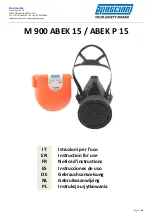
The safety of a dive can only be assured by
adequate preparation.
DACOR recommends taking a specialist training
course before diving with a dive computer.
DACOR recommends scrupulous observance of the
simple safe diving rules set out in the paragraph
on "responsible diving practices".
R
ESPONSIBLE DIVING PRACTICES
Always plan your dives in advance.
Never exceed the limits of your skill and
experience.
Go to the deepest planned depth at the
beginning of the dive.
Check your computer frequently during the dive
Comply with the ascent rate indicated by the
computer.
Always do a safety stop at 10 - 16 feet (3 - 5
meters) for at least 3 minutes.
After the safety stop, ascend very slowly to
the surface.
Avoid yo-yo dives (repeatedly ascending and
descending underwater).
Avoid strenuous activity during the dive and
for half an hour after surfacing.
When diving in cold water or in the case of a
strenuous dive, start ascending well before
reaching the NO DECO limits.
If it is a decompression dive, prolong the
decompression stop nearest to the surface by
several minutes.
Repetitive dives should be separated by a
surface interval of at least 2 hours.
Your deepest dive should be the first one of
the day.
Avoid diving until the computer memory has
cleared from the preceding day's dive.
When doing repetitive dives for several
consecutive days, take at least one day off from
diving every week. In the case of
decompression-stop diving, it is recommended to
take one day off from diving every three days.
Avoid planned decompression dives and do not
dive deeper than 130 feet (40 meters) unless
you have been specifically trained in this type
of technical diving.
Avoid repetitive "square profile" dives (dives to
a single depth) deeper than 60 feet (18 meters).
Always wait as long as possible before flying
after a dive (at least 12 and preferably 24
hours), in accordance with the recommendations
of the Divers' Alert Network.
!
WARNING
Before starting a "Nitrox" dive, check
that the dive computer is set to
"Nitrox" mode, then check the
composition of the breathing mix you
will be using and enter its oxygen
percentage in the appropriate SET
function.
Entering an incorrect oxygen percentage
will lead to errors in the readouts for:
- no-decompression time remaining;
- decompression stop times;
- alarm for exceeding the maximum
permitted O
2
partial pressure.
!
WARNING
The use of oxygen-rich mixtures exposes
the diver to different hazards from those
associated with compressed air. The diver
must be aware of these risks and
understand how to avoid them.
!
WARNING
DARWIN may be used with oxygen-rich
mixtures (nitrox) ONLY by suitably
trained and certified divers. Attempting
to dive without adequate nitrox training
might result in serious injury.
!
WARNING
Do not dive in mountain lakes without
having first checked that the
appropriate altitude program is
enabled.
!
WARNING
Check the battery power level before
starting your dive.
Do not dive if the <battery> icon
indicates that the battery is low. Replace
the batteries.
DARWIN DIVE COMPUTER
3
ENGLISH
Darwin.qxd 29/03/2002 16.45 Pagina 3
Summary of Contents for DARWIN
Page 24: ...136 Darwin qxd 29 03 2002 16 47 Pagina 136...
Page 25: ...137 FIGURES FIG A Darwin qxd 29 03 2002 16 47 Pagina 137...
Page 26: ...138 Darwin qxd 29 03 2002 16 47 Pagina 138...
Page 27: ...139 FIGURES FIG B Darwin qxd 29 03 2002 16 48 Pagina 139...
Page 28: ...140 FIG C Darwin qxd 29 03 2002 16 48 Pagina 140...
Page 29: ...141 FIGURES FIG D Darwin qxd 29 03 2002 16 48 Pagina 141...
Page 30: ...142 FIG E Darwin qxd 29 03 2002 16 48 Pagina 142...
Page 31: ...143 FIGURES FIG F Darwin qxd 29 03 2002 16 48 Pagina 143...





































